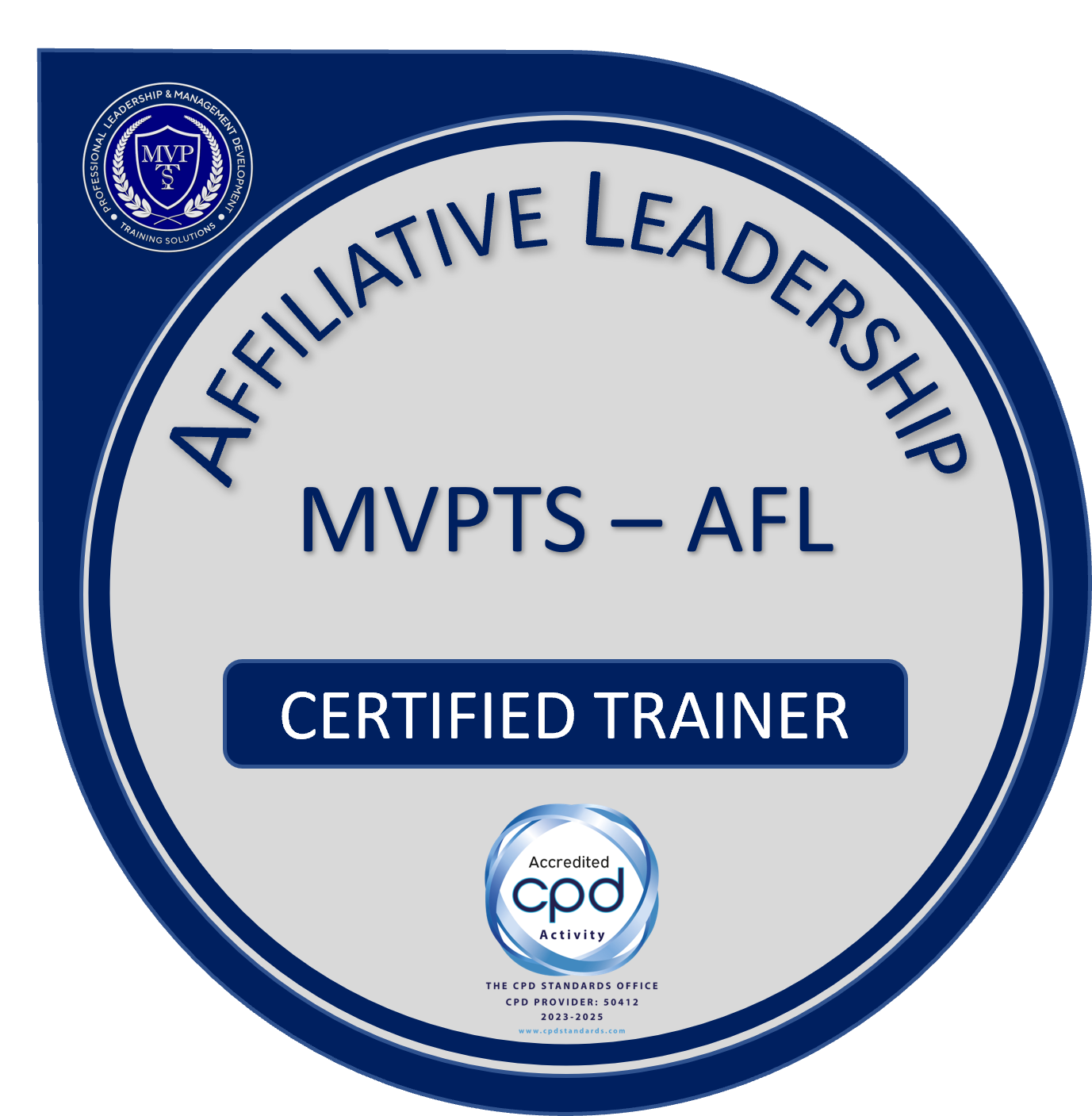Affiliative Leadership Mastery

Course Description
Title: Certified Master of Affiliative Leadership in Collaborative Cultures
Embark on a comprehensive exploration of “Affiliative Leadership in Collaborative Cultures” with our focused course, delving into principles, techniques, and applications across diverse organizational contexts. Uncover the significance and benefits of affiliative leadership in fostering collaborative, emotionally intelligent teams. Explore various leadership styles and the role of affiliative leadership through real-world examples. Immerse yourself in core principles, including trust-building, collaborative environments, well-being prioritization, and harmonious integration with other styles. A profound emphasis on emotional intelligence highlights the critical role of self-awareness, empathy, and effective communication. Learn to create positive work cultures, employ advanced communication strategies, and empower team members for growth. Gain insights into leading through change, measuring impact, and navigating ethical considerations with integrity. Emerge equipped with a robust toolkit to lead and thrive in today’s dynamic organizational landscape.
Topics Covered
1. Module I: Introduction to Affiliative Leadership
- Understanding Leadership Styles
- Significance of Affiliative Leadership
- Exploring the Origins and History of Affiliative Leadership
- Examples of Successful Affiliative Leaders
2. Module II: Core Principles of Affiliative Leadership
- Building Trust and Rapport
- Creating a Collaborative Environment
- Prioritizing Relationships and Well-Being
- Balancing Affiliative Leadership with Other Styles
3. Module III: Emotional Intelligence and Affiliative Leadership
- Role of Emotional Intelligence
- Recognizing and Managing Emotions as an Affiliative Leader
- Empathy and Compassion in Affiliative Leadership
- Developing Self-Awareness and Social Awareness within Affiliative Leadership
4. Module IV: Using Affiliative Leadership to Create a Positive Work Culture
- The Impact of a Positive Work Culture on Employee Engagement
- Promoting Creativity and Innovation in a Positive Culture
- Implementing Affiliative Leadership in Remote and Virtual Work Environments
- Affiliative Leadership’s Influence on Employee Retention
5. Module V: Communication Strategies for Affiliative Leaders
- Core Principles of Affiliative Communication
- Communication in Diverse Teams
- Communication Across Hierarchies
- Crisis Communication and Affiliative Leadership
6. Module VI: Team Building and Collaboration as an Affiliative Leader
- Forming Cohesive Teams
- Leveraging Strengths and Diversity
- Collaborative Decision-Making
- Promoting Knowledge Sharing
7. Module VII: Adaptability in Affiliative Leadership
- The Core Principles of Adaptability
- Leading by Example in Affiliative Leadership
- Demonstrating Time Management
- Conflict Resolution Skills
8. Module VIII: Emotional Resilience for Affiliative Leaders
- Managing Stress and Emotional Challenge
- Building Personal Resilience as the Affiliative Leader
- Handling Criticism Effectively as an Affiliative Leader
- Self-reflection for the Affiliative Leader
9. Module IX: Empowering and Developing Team Members as the Affiliative Leader
- Nurturing Growth and Potential
- Effective Delegation
- Providing Skill Development Opportunities
- Encouraging Autonomy and Accountability
10. Module X: Leading Through Change and Uncertainty as the Affiliative Leader
- Understanding the Nature of Change and Uncertainty as the Leader
- Understanding the Impact of Change on Teams
- Maintaining Team Morale During Uncertain Times
- Leading Remote and Virtual Teams through Change
11. Module XI: Measuring Success and Impact of the Affiliative Leader
- Identifying Performance Indicators
- Quantitative and Qualitative Measures
- Evaluating Team Productivity and Engagement
- Continuous Improvement Through Feedback
12. Module XII: Ethical Considerations in Affiliative Leadership
- Ethical Responsibilities of Leaders
- Balancing Individual and Team Needs Ethically
- Addressing Power Dynamics
- Fostering Integrity
How to use this Certification
- Effective Team Building: Develop and lead cohesive teams, fostering a positive and collaborative work environment.
- Conflict Resolution Skills: Acquire the ability to navigate and resolve conflicts within teams, promoting harmony and productivity.
- Enhanced Communication: Hone communication skills to inspire and motivate team members, creating a culture of open dialogue.
- Increased Emotional Intelligence: Understand and manage emotions, creating a more empathetic and supportive leadership style.
- Adaptability and Flexibility: Learn to adapt leadership approaches to different situations, promoting versatility and resilience.
- Strengthen Relationships: Build strong and trusting relationships with team members, peers, and stakeholders.
- Boosted Morale and Engagement: Implement strategies to enhance employee morale and engagement, leading to increased productivity.
- Cultivation of a Positive Culture: Instill an affiliative leadership culture that promotes a sense of belonging and shared goals.
- Conflict Prevention: Develop skills to proactively identify and address potential conflicts, preventing disruptions to teamwork.
- Organizational Success: Drive overall organizational success by creating a leadership style that values collaboration, empathy, and shared achievements.
Target Audience
- Current and Aspiring Managers: Individuals who are already in managerial roles or aspiring to become managers will benefit from learning how affiliative leadership can enhance team dynamics and improve organizational outcomes.
- HR Professionals: Human resources practitioners seeking to foster a positive work culture and facilitate effective communication within teams will find this course valuable.
- Team Leaders: Those who lead small to medium-sized teams can enhance their leadership skills by understanding how to build trust, collaborate, and support team members’ well-being.
- Project Managers: Project managers looking to create cohesive project teams and navigate changes effectively will gain insights into how affiliative leadership techniques can contribute to project success.
- Entrepreneurs and Small Business Owners: People in charge of their own companies will learn how, even in more intimate contexts, affiliative leadership concepts may support a robust corporate culture and cooperative teamwork.
- Nonprofit Leaders: Leaders in nonprofit organizations can learn how affiliative leadership can improve team morale and enable more compassionate and effective ways of working towards their missions.
- Educational Administrators: Affiliative leadership approaches can be used by those in educational leadership roles to establish welcoming and encouraging learning environments for staff, instructors, and students.
- Healthcare Managers: Managers in healthcare settings can utilize affiliative leadership strategies to improve patient care, enhance staff well-being, and navigate the complexities of the healthcare industry.
- Cross-Functional Team Members: Individuals working in cross-functional teams will benefit from understanding how affiliative leadership can facilitate collaboration, foster understanding, and improve overall team performance.
- Leadership Development Coordinators: Organizations investing in leadership development can incorporate this course into their programs to equip emerging leaders with the critical tools to lead with empathy, resilience, and ethical integrity.
Learning Objectives
- Understand the concept of affiliative leadership and its role within the spectrum of leadership styles.
- Analyze the significance and benefits of affiliative leadership in promoting team cohesion, trust, and well-being.
- Apply core principles of affiliative leadership, such as trust-building and creating a collaborative environment, to real-world leadership scenarios.
- Develop emotional intelligence skills, including recognizing and managing emotions, empathizing with team members, and cultivating self-awareness.
- Implement strategies for shaping a positive work culture, fostering inclusivity, and effectively addressing conflicts within teams.
- Utilize advanced communication techniques, including active listening and motivational feedback, to enhance team communication and engagement.
- Formulate effective team-building strategies, leveraging diversity and strengths for collaborative decision-making and knowledge sharing.
- Adapt affiliative leadership techniques to different organizational contexts and challenges, demonstrating flexibility and adaptability.
- Cultivate emotional resilience as an affiliative leader, managing stress, supporting team members’ emotional well-being, and maintaining balance.
- Lead teams through change and uncertainty with stability, trust, and an affiliative leadership approach, utilizing strategies for alleviating anxieties.
Learning Outcomes
- You will be able to define affiliative leadership and distinguish it from other leadership styles, showcasing comprehension of leadership diversity.
- You will recognize the significance of affiliative leadership in nurturing cohesive, high-performing teams that prioritize trust and well-being.
- By employing core affiliative leadership principles, learners will be able to create collaborative team environments that foster open communication and trust.
- You will demonstrate enhanced emotional intelligence by understanding and controlling your own feelings as well as those of your teammates.
- You will be able to shape positive work cultures by implementing inclusivity strategies and effectively addressing conflicts through constructive means.
- Through advanced communication techniques, learners will showcase active listening skills and deliver motivational feedback to enhance team motivation and cohesion.
- You will employ team-building strategies to promote diversity and knowledge sharing, facilitating informed, collaborative decision-making.
- You will adapt affiliative leadership approaches to various organizational contexts, effectively navigating challenges with flexibility.
- By implementing emotional resilience strategies, learners will manage stress, support team members during emotional challenges, and achieve personal balance.
- Graduates of the course will lead teams through periods of change and uncertainty, maintaining stability and trust using affiliative leadership strategies and demonstrating the ability to alleviate anxieties.
